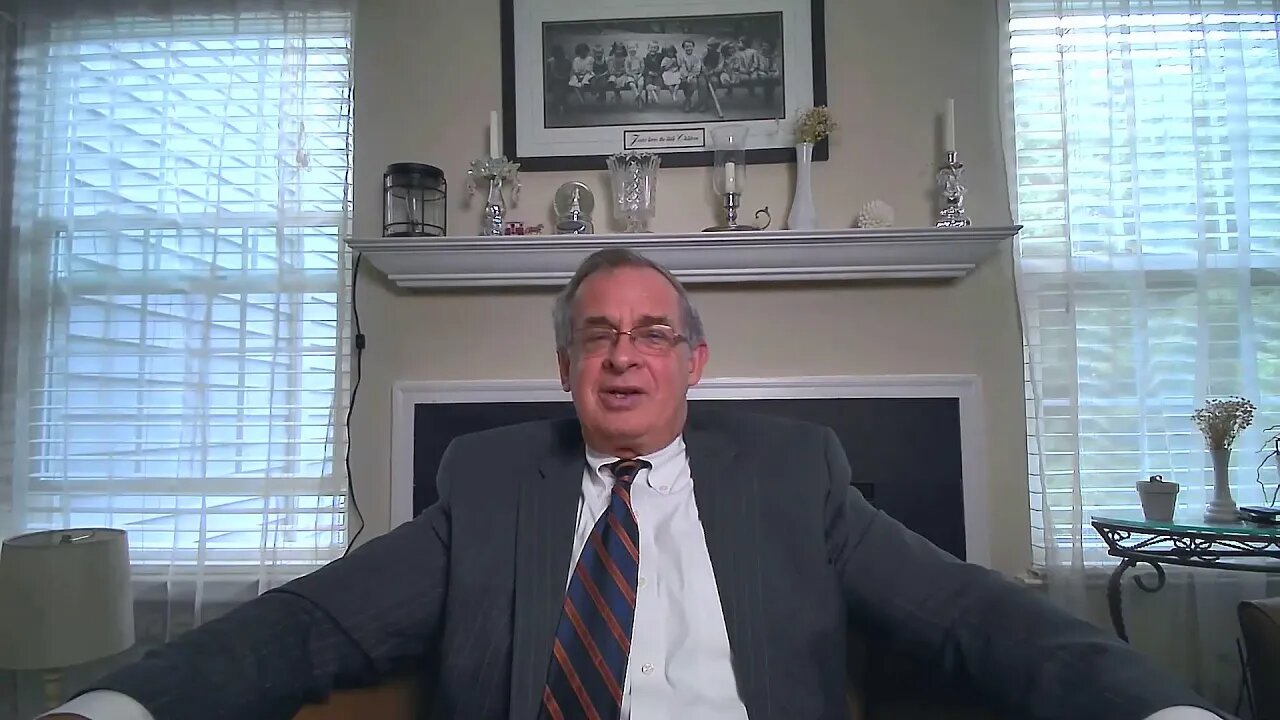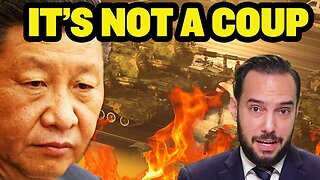Premium Only Content

Dr. Peter Van Kleeck, Sr. Providence Baptist Ministries 7/16/23 Heb. 11:27 SEEING THE INVISIBLE
TITLE: SEEING THE INVISIBLE
TEXT: Hebrews 11:26-27
INTRODUCTION: This passage describes the Christ-centeredness of the thinking of the OT saints.
1. The Riches of Reproach: “Esteeming the reproach of Christ great riches than the treasures of Egypt”
A. What is the “reproach of Christ?” -- Christians at that time would naturally describe all sufferings on account of the Christian faith as endured in the cause of Christ; and Paul, therefore, may have used this phrase to denote sufferings in the cause of religion -- the apostle uses the expression as a sort of technical phrase, well understood in his time, to denote sufferings endured in the cause of religion. Moses put greater value on identifying with suffering for the cause of Christ than he did on all the money in Egypt.
B. See Acts 5:41 – of Peter and the other Apostles, “And they departed from the presence of the council, rejoicing that they were counted worthy to suffer shame for his name.” They were honored to be party to the suffering that their Lord and Master suffered. 1 Peter 4:13-14, “But rejoice, inasmuch as ye are partakers of Christ's sufferings; that, when his glory shall be revealed, ye may be glad also with exceeding joy. If ye be reproached for the name of Christ, happy are ye; for the spirit of glory and of God resteth upon you: on their part he is evil spoken of, but on your part he is glorified.”
C. What a contrast Paul lays out in this passage – the ultimate materialistic dream life – palaces, gigantic yachts, every worldly possession, and power all considered of little value compared to the riches of suffering for the cause of Christ. Moses is Moses because you can imagine that only a few would give up such a life.
D. How rich was the treasures of Egypt? One historian wrote of this time, “The history of the 18th Dynasty (1550—1295 BC) serves as an allegory of unrestrained ambition and greed for all times. A combination of factors brought into being a line of kings who presided over what became temporarily the wealthiest and most powerful nation in the region.”
2. The Recompense of Reward: “For he had respect unto the recompense of reward.”
A. What is “had respect” – Literally – Moses looked away from the treasures of Egypt to the recompense of reward – to the reception of the reward – what has real value.
B. “the recompense of reward?” – payment of the reward; this undoubtedly refers to heaven. He no longer looked at Egypt as possessing any value and looked to those things of eternal value – the reward of heaven.
C. See Psalm 73:17-24 – What life is all about.
3. A Courageous Forsaking: “By Faith he forsook Egypt, not fearing the wrath of the king”
A. What does it mean to say, “he forsook Egypt?” Moses wasn’t going back. Others had not forsaken Egypt. Egypt was Plan B, the fallback plan, a possibility if things got bad, but not for Moses. He had one course, one path, one direction, one purpose – to free and lead the people of God to the Promised Land. There was no going back.
The folks Paul was writing to were considering going back; things were tough for first century Christians; maybe it’s time to reconsider this Christianity thing.
B. What was the king in his anger going to do to Moses?
4. For he endured
A. What is this endurance? In the presence of Pharaoh (or in the weariness of exile) he was strong and patient, as seeing the invisible King and Leader of His people.
B. Why is endurance important? No giving up; not forsaking your calling. He persevered, amidst all the trials and difficulties connected with his leading forth the people from bondage. This is the kind of men and women God needs to get the job done. Many have given up a Standard Sacred Text; many have given up the great hymns of the faith; many have given up the importance of sound doctrine and fervent preaching; many have given up period. The pressures of life have been too much so they have given up for the sake of their own comforts. Moses never gave up.
And why didn’t he give up? He was living in the presence of God.
5. As seeing him who is invisible – "As if" he saw God. He had no more doubt that God had called him to this work, and that he would sustain him, than if he saw him with his physical eyes.
6. This is a most accurate account of the nature of faith; compare notes on Hebrews 11:1.The substance of things hoped for; the evidence of things not seen.
A. Not simply that God is beyond the scope of our vision – like we can’t see into heaven. No God is intrinsically invisible – he cannot be seen. 1 Tim. 6:16, “Who only hath immortality, dwelling in the light which no man can approach unto; whom no man hath seen, nor can see: to whom be honour and power everlasting. Amen.”
B. With “the eye of faith” Moses lived his life. As if God was physically beside him.
-
 LIVE
LIVE
Flyover Conservatives
21 hours agoFederal Reserve on the Chopping Block—Trump’s Boldest Move Yet! - Floyd Brown, Western Journal | FOC Show
824 watching -
 LIVE
LIVE
Melonie Mac
7 hours agoGo Boom Live Ep 38!
430 watching -
 11:08
11:08
China Uncensored
6 hours agoXi Jinping's Greatest Fear
1.1K2 -
 LIVE
LIVE
I_Came_With_Fire_Podcast
11 hours agoFar Left TROJAN HORSE | SPECIAL Forces in MEXICO | GERMANY under FIRE
152 watching -
 1:41:00
1:41:00
Darkhorse Podcast
8 hours agoIf Only We’d Known: The 265th Evolutionary Lens with Bret Weinstein and Heather Heying
86.9K31 -
 1:58:29
1:58:29
Conspiracy Pilled
3 days agoThe Vaccine Conversation (S5 - Ep17)
27K -
 11:22
11:22
Tundra Tactical
5 hours ago $2.11 earnedUSA vs Canada HOCKEY Fight: The Real PRIDE Fighting.
37.4K3 -
 54:43
54:43
LFA TV
1 day agoWhy Exposing Waste and Fraud Terrifies the Beltway | TRUMPET DAILY 2.19.25 7PM
37K5 -
 1:01:13
1:01:13
Candace Show Podcast
7 hours agoBlake Lively's BOMBSHELL Legal Filing | Candace Ep 149
106K128 -
 1:11:22
1:11:22
Vigilant News Network
10 hours agoElon Musk Shuts Down RFK Jr. Critics With One Powerful Statement | The Daily Dose
72.2K28